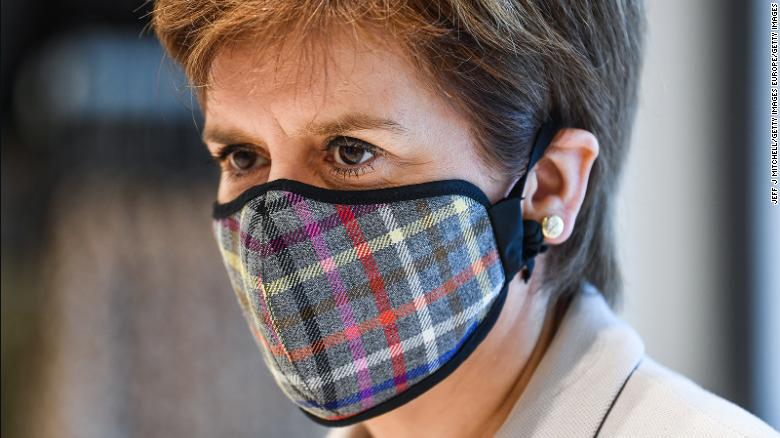“The Union is a fantastically strong institution — it’s helped our country through thick and thin,” he said. “I think what people really want to do is see our whole country coming back strongly together, and that’s what we’re going to do.”
Together, perhaps, but not with Scotland’s leader. For his first trip to Scotland this year, Johnson chose a sparsely populated group of islands hundreds of miles from the seat of Scottish political power in Edinburgh; he did not meet with Scotland’s top elected official, First Minister Nicola Sturgeon.
Divergent approach
One of the many lessons from the pandemic in the UK has been the starkly different governing styles of the country’s political leaders.
Sturgeon was not impressed. “I don’t know what ‘stay alert’ means,” Sturgeon said at the time, adding that she had asked the British government not to deploy that slogan in Scotland.
When Johnson’s government introduced new rules that allowed residents to visit certain countries without quarantining on return, Sturgeon called the decision-making process “shambolic.” Unlike Downing Street, she refused to allow unrestricted travel from Spain.
Another area of divergence has been over the issue of face coverings — Sturgeon made them mandatory in shops here a full two weeks before Downing Street followed suit with a similar ordinance for England. Sturgeon’s tartan face mask has become a sartorial signature.
Johnson has not resisted masks with the zeal of US President Donald Trump, but he is more often seen without a face covering, even indoors, than with one. His visit to Orkney drew a small protest; one man heckled, “Where’s your mask, Boris?”
Perception of power
To an outsider (and in fact to many Brits), the division of power in the UK can be confusing. Boris Johnson is Prime Minister of the United Kingdom of Great Britain and Northern Ireland, but since the late 1990s, much power has been transferred to the UK’s constituent nations — a process known as devolution.
This means many policy decisions concerning health, education, and transportation for Scotland, Wales and Northern Ireland are taken not in London, but in Edinburgh, Cardiff and Belfast. It has not been unusual to see a grand policy announcement emanating from Downing Street, only to find a postscript explaining that the rule only applies to England.
“This is really the most significant time where devolution has been the most obvious to the ordinary citizens,” the pro-independence pollster Mark Diffley said on a typically rainy summer day in Edinburgh.
That perception is evident on the streets of Scotland’s capital. “London is too choppy, too changing its mind all the time, can’t make out what it wants to do,” said Karen Miele, 58, from Edinburgh. “Does it want to help people? Does it want to put the economy first? Or does it just not care? Doesn’t know what it’s doing.”
Andrew MacDonald, 21 from Linlithgow, said that his view of Sturgeon has “definitely gone up” over the course of the pandemic. “I think Nicola has done the right thing in trying to keep the politics out of it, and go with the science first and foremost throughout the whole thing,” he said.
Despite this perceived divergence in approach, Covid-19 outcomes — so far, at least — have not been so dissimilar. In fact, the death rate in Scotland has only been slightly better than in England. For every 100,000 people, 77 in Scotland have died and had Covid-19 listed on their death certificate, versus 86 in England.
“There are important differences in the approach, and also important differences in the public perception of the approach,” said Linda Bauld, professor of public health at the University of Edinburgh.
Boost for independence
The question for Sturgeon — and the fear for Johnson — is whether this positive regard for her stewardship of the pandemic will transfer into political support for the cause of Scottish independence, which remains the bedrock goal of her Scottish National Party.
The last time Scots formally voted on independence, in 2014, “no” won out by more than 10 percentage points. Much has since changed. In the 2015 UK general election, the SNP went from six seats at the House of Commons in Westminster to 56 — taking all but three Scottish constituencies. Scots voted heavily against Brexit in 2016.
The renowned pollster John Curtice, of the University of Strathclyde, told the BBC on Thursday that support for independence has been surging for about and a year, and is now going up even among those Scots who voted for Brexit.
The latest polling, Diffley said, “would suggest that support for independence is higher than it has been for actually a really, really long time.”
That’s a problem for Johnson, leader of a party whose full name is the Conservative and Unionist Party. By visiting Scotland, Johnson hoped to underline the benefits to Scots of the 300-year-old union with England — he was keen to point out that it was the Treasury in London that saved thousands of Scottish jobs with its generous furlough scheme, for example.
The SNP had promised a new referendum on independence before next year’s Scottish parliamentary elections. That’s now been put on hold, because of the pandemic.
For SNP members of parliament like Tommy Sheppard, who represents Edinburgh East, it is only a matter of time. “Those who wish to see Scotland become an independent country welcome as many trips as possible by Boris Johnson to Scotland, because every time he sets foot in Scotland, support for independence increases,” he said.
The pandemic response, he believes, has opened many skeptical Scottish eyes to the real differences between Scotland and England.
“They’re aware of that in the way they never were before. And they are perhaps open to the possibility of what an independent Scotland could do if it had the political power to act.”




Average Rating